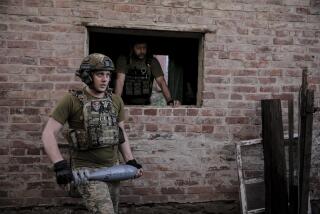Russia OKs Limited Chechen Amnesty
- Share via
MOSCOW — Russian lawmakers overwhelmingly approved a limited amnesty for separatist rebels in war-torn Chechnya on Friday, bidding to isolate hard-core fighters by offering less committed guerrillas a return to civilian life.
The measure reflects Russian President Vladimir V. Putin’s two-pronged strategy to pacify Chechnya by crushing pro-independence forces militarily while granting limited autonomy to a Chechen government to be elected this year.
The amnesty program’s passage comes just a day after the latest in a string of suicide bombings linked to rebel forces. The death toll in Thursday’s bombing of a bus, which was headed toward a military base used by Russians fighting in Chechnya, rose to 20 on Friday, Russian media reported.
Violence continued Friday with a shootout between government and rebel forces in the town of Argun, five miles from the Chechen capital, Grozny, that left about 10 guerrillas dead, Russian news agencies said. Two policemen also died, according to a city official quoted by the Itar-Tass news service.
Critics who believe Moscow should negotiate with separatist leaders have ridiculed the amnesty program because it does not apply to those who have committed grave crimes, meaning that any guerrilla found to have killed a Russian soldier or policeman would not be eligible. Some argue that the law is written in such a way that even an attempt to shoot a Russian serviceman -- practically the definition of a rebel fighter’s job -- would be disqualifying.
“Formally, one can expect to be amnestied only if he never touched a weapon and has been sitting high up in the mountains cooking food for the rebels,” said Andrei Piontkovsky, director of the Independent Institute for Strategic Studies, a Moscow think tank.
But the point of the plan is not to try to convince the main rebel forces -- which authorities describe as terrorists or criminals -- to give up and join a political process, its backers said Friday.
“We are giving a chance to those who committed no serious crimes and found themselves on the other side of the barricades -- for money, out of deception or because of a mistake,” presidential aide Sergei Yastrzhembsky told a news conference. “According to our information there are many people like this.”
Those wishing to accept the offer must give up their weapons and apply before Sept. 1.
The measure also grants amnesty to Russian police and soldiers for some crimes against Chechens. He said about 210 Chechens now in detention and up to 200 Russian servicemen accused of various offenses may be eligible for amnesty. The bill passed 352 to 25 in the 450-seat State Duma and takes effect upon its official publication today.
The amnesty fits into a political process that began with a March referendum in which Chechen voters endorsed a new constitution designed to thwart independence of the Caucasus republic but pave the way for limited autonomy.
Yastrzhembsky said three suicide bombings in or near Chechnya during the past month, which killed nearly 100 people, were intended to undermine these efforts. “The series of terrorist attacks that have been committed of late is aimed at exacerbating the situation in the region and provoking federal authorities into tough measures,” he said. “However, all these attempts are doomed to failure.”
Chechens exercised self-rule after defeating Russian troops in a 1994-96 war. Aslan Maskhadov, now a guerrilla leader, was elected president in 1997. But Russian forces returned in 1999 and have fought separatists ever since.
The republic’s new constitution, which firmly anchors Chechnya in Russia, was strongly promoted by the Moscow-backed Chechen administration headed by Akhmad Kadyrov. He is expected to be a leading candidate in a Chechen presidential election this year.
Increasingly strong Chechen security forces under Kadyrov’s control could turn out to be the main beneficiaries of the amnesty, Piontkovsky said.
“The only party that benefits from amnesty is Kadyrov and his people,” he said. “It is an open secret that today’s head of the republic controls an army that by far dwarfs that of Maskhadov. And most of these people are far from having a clean record with law enforcement bodies. The amnesty washes away all their previous sins and totally legitimizes these heavily armed units.”
This “personal army” will serve Kadyrov as “a very useful asset on the eve of the coming elections,” Piontkovsky said.
“The declared amnesty and the events that have been unfolding in Chechnya lately exist in two different, not even parallel worlds,” he added.
“One world is the hard and sad reality, while the other one is a make-believe world invented by the Russian authorities to promote complacency and make the international community happy.”
Piontkovsky noted that when many Western leaders visited St. Petersburg at the end of May, their comments to Putin were generally positive toward the referendum and the possibility that it could lead to a political settlement. Despite the urgings of human rights organizations, there was very little comment by Western leaders in St. Petersburg about human rights abuses by Russian forces, which critics see as a key aspect of the problem in Chechnya.
Still, a political solution is possible, Piontkovsky said. “But to reach this solution it is necessary to negotiate with the opposing side: with those who kill Russian soldiers and get killed by them,” he said. “If there is no peace process, having an amnesty is like eating a side dish without the main course.”
*
Alexei V. Kuznetsov of The Times’ Moscow Bureau contributed to this report.
More to Read
Sign up for Essential California
The most important California stories and recommendations in your inbox every morning.
You may occasionally receive promotional content from the Los Angeles Times.













